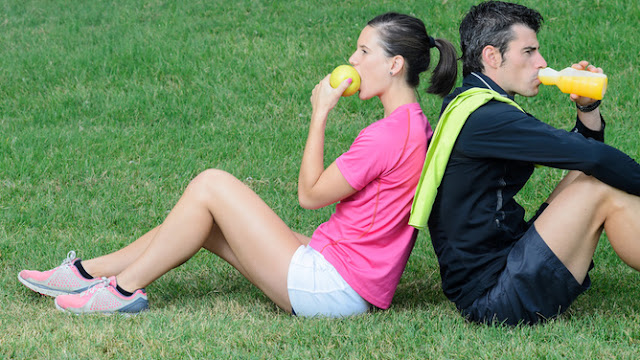Food: how to recover well after a sports activity?

Fight against fatigue, promote rehydration and muscle recovery, replenish energy: the diet is fully involved in recovery after a sports activity . Explanations.
After sports activity, specific nutrients
It is established, a specific diet after the effort related to a sports activity promotes a good recovery , so a lower risk of accident, injury or fatigue.
"In practice, there are 3 major fundamentals, explains Pr. Xavier Bigard *. It is necessary to recover the sugars (carbohydrates) burned during the effort, but also the water and the mineral salts lost by the transpiration (according to the duration of the effort, its intensity but also the climatic conditions), and to bring proteins, to re-synthesize muscle proteins destroyed during exercise (following, among other things, microlesions of muscle fibers). "
The most urgent ? Proteins, to be consumed within 30-60 minutes after stopping physical exercise. "We count about 20g of proteins, the most recommendable being those extracted from milk or eggs and vegetable proteins of soya: the other sources of proteins are less interesting, because of their composition in amino acids, their digestibility but also their palatability, Explains the specialist.
These proteins can be found in for example about 2/3 liter of milk.
Protein, but also sugar, salt and water
Then, we rebuild the glycogen reserves and we restore the lost water, drinking sweet: either a commercial energy drink (type Isostar, Gatorade or Powerade, not to be confused with energy drinks, useless), a drink made by yourself (fruit juice, water and sugar).
- Sugar: the dose of sugar will depend on the duration of the physical exercise and the transpiration emitted:
- If we sweat a lot, we will dose the drink at 30-40g of sugar / liter (it will therefore dilute the energy drink, naturally much more concentrated, read the label).
- If it is cool and little sweat, we can drink it directly (50-70g / liter of sugar).
- Water: how much to drink?
It is best to weigh yourself just before and after the training to find out how much water has been removed (in the same outfit and on the same scale, of course), and make up the difference, but by consuming a little more: by For example, if you lose 1 kilo, you drink 1.4 to 1.5 liters because not all the water will be stored: some will be eliminated directly.
This drink will be consumed slowly after the proteins, not forgetting, if you make it yourself, to add 1 to 2 pinches of salt (no more), to compensate for the lack of sodium due to perspiration losses during exercise but also to promote the absorption of sugar by the intestine.
On the other hand, it is always useful to remember that one can make a jog of 30-40 minutes without having to hydrate. But as soon as the physical exercise is sustainable (2-3 hours of bike for example), it is better to hydrate during the effort by regularly drinking a few sips. Not to mention that by bike for example, we do not feel the importance of perspiration (because with the speed it evaporates immediately on the skin), as in skiing elsewhere (where we lose a lot of water by the breathing, because of the altitude).
Once these reserves are redone, we can resume a normal diet , without forgetting however to salt his dishes again at the next meal, if it was very hot and we have abundantly perspired.
Specific food supplements dedicated to recovery
New specific dietary supplements also offer:
- to improve sport recovery,
- to fight against fatigue (and the injuries it can cause),
- to relieve those who put themselves to sport,
- or those who resume the sporting activity (after a stop, whether consecutive or not to an injury),
- or those who train regularly but may experience empty passages. Thus, "the principle of a food supplement ** dedicated to sports recovery is to activate the creation of energy during the activity, and to facilitate the elimination of waste (especially nitrogen) to reduce muscle aches and pains Explains Henriette Lopy-Leparoux, head of the sports division of the Biocodex laboratory.
What are these dietary supplements composed of? They contain citrulline malate. Malate, extracted from the apple, is an activator of energy production by mitochondria, microscopic "power plants" of the cell. Citrulline is an amino acid intermediate to the urea cycle, which will accelerate the excretion of ammonium. These dietary supplements are convenient to consume, in pods of gel.










Post a Comment